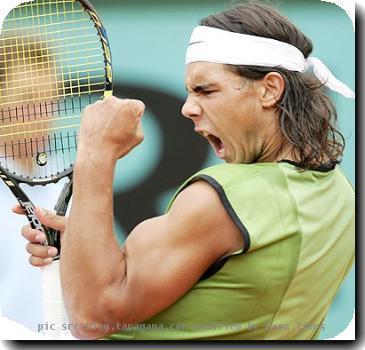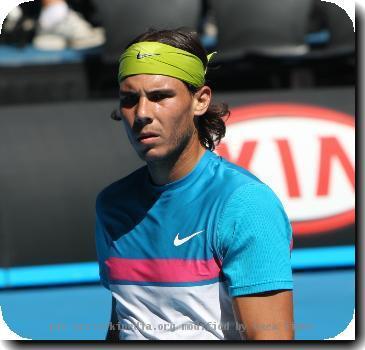ATHLETE OF THE DECADE: Numbers, and there are plenty, don’t do justice to Federer’s Grand run
By Howard Fendrich, APSaturday, December 12, 2009
Federer’s 15-Slam decade was Grand as could be
Set aside, for the moment, Roger Federer’s athleticism and artistry, his sturdiness and strokes. Start instead with the pure numbers, simply because they serve as an objective — and overwhelming — measure of his supremacy on a tennis court:
—15 Grand Slam singles titles;
—21 Grand Slam finals overall, and 17 of the last 18;
—22 consecutive Grand Slam semifinal appearances;
—237 consecutive weeks (about 4½ years) ranked No. 1;
—24 consecutive victories in tournament finals;
—65 consecutive victories on grass courts;
—56 consecutive victories on hard courts.
Go ahead, scan that list again.
All are records, some by large margins, surpassing the achievements of such greats of the game as Pete Sampras, Bjorn Borg, Rod Laver, John McEnroe. All were achieved during a remarkable run of dominance that began in 2003, building a case for Switzerland’s Federer to be selected as The Associated Press’ Athlete of the Decade.
“What he’s done over the past five years has never, ever been done,” Sampras said the day Federer won the 2009 French Open, “and probably will never, ever happen again.”
That title in Paris this June was significant: Federer tied Sampras’ career record of 14 major championships, a mark he would go on to eclipse a month later at Wimbledon; he finally ended his seemingly quixotic quest for a first French Open trophy; he became the sixth man in tennis history with a career Grand Slam.
And to think: On May 26, 2003, a 21-year-old Federer lost at the French Open to Peru’s Luis Horna (it’s OK to ask “Who?”), his sixth first-round exit in 16 career Grand Slam tournaments to date. That made Federer a combined 29-16 — a .644 winning percentage — at his sport’s four most important sites, with zero semifinals in that span.
“I was so weak mentally,” Federer once said, recalling that setback-cum-turning-point against Horna. “I had to toughen up a bit, you know? It was just one of those moments when I finally realized I have to still change a few things. Because I thought I had everything figured out by then. But I didn’t.”
He soon would. The very next major tournament, Wimbledon in 2003, represented the breakthrough. Starting with that fortnight, which culminated with Federer in tears on Centre Court after winning his first major title, his record at the past 26 Grand Slam events is 159-11, a .935 winning percentage.
Federer owns six championships from Wimbledon, five from the U.S. Open, three from the Australian Open, and that precious one from the French Open, part of his tour-leading haul of 61 titles this decade.
But enough with the numbers for now, because as informative as statistics may be, they hardly tell the full tale. Federer must be seen with racket in hand to truly appreciate the way he reshaped the geometry of tennis with an all-surface, all-around game full of verve and versatility.
At times, he’s elegant. At others, overpowering. Serves, returns, forehands, backhands, volleys — name it, Federer excels at it, and can discuss it in three languages (his postmatch news conferences are routinely conducted in English, French and Swiss German).
He can outwit an opponent or outmuscle him. He can play aggressive offense or foe-dispiriting defense — and switch from one to the other in a blink. Like his pal Tiger Woods, Federer brings an unmatched creativity to his sport. Not only do both try shots hardly anyone else would even think of, they pull them off.
One example of recent vintage: Federer’s back-to-the-net, between-the-legs, crosscourt passing shot against Novak Djokovic at this year’s U.S. Open. If you’re a tennis fan — scratch that, a sports fan — do yourself a favor and search for “Federer trick shot” on YouTube.
“It’s amazing what sort of shots he can come with, from impossible positions,” said Laver, who twice won a true, calendar-year Grand Slam, pretty much the only feat Federer hasn’t accomplished. “It’s a great feeling of being able to watch the talent that he has, and the opponents that he beats comfortably.”
Yes, plenty of players could be excused for wishing they had come along in another era.
Consider Federer’s head-to-head records against these former No. 1s and Grand Slam champions: Andre Agassi (8-3), Andy Roddick (19-2), Lleyton Hewitt (16-8), Marat Safin (10-2). Then there is Federer’s record against Sampras — 1-0, thanks to a fourth-round upset at Wimbledon in 2001 that ended Pistol Pete’s 31-match winning streak there.
If there is a sour note for Federer, of course, it is his 7-13 mark against Rafael Nadal, the one man who seems capable of transforming tennis’ Mozart into Salieri. Nadal has defeated Federer in five of their seven Grand Slam final meetings, including at Wimbledon in 2008, an epic tussle that ended 9-7 in the fifth set at dusk and is considered by many the greatest match ever played.
Hey, even the elite can’t win them all. Plus, it’s worth noting that Nadal is always quick to refer to his rival as the best player in history.
Others do, too.
“What he’s done is arguably as great of an achievement as anybody can ever have in any sport,” said Agassi, an eight-time major champion who lost to Federer in the 2005 U.S. Open final, “and I think tennis is one of the most brutal forms of sport. I think it’s physical, and there’s so many components to come together to make a tennis player, from balance to power to grace to fitness to concentration.”
Federer can’t rely on teammates. Most of the time, he’s without a coach, too, opting to work things out on his own. And his is not the every-four-years magnificence of an Olympian or half-calendar excellence of an NFL or baseball star. His is week-in, week-out, January-to-November, hopping-the-globe, indoor, outdoor, grass, clay, carpet, hard courts superiority.
Let’s not forget durability, either. Federer played in all 40 Grand Slam tournaments from 2000-09, something only one other man managed to do.
Asked recently how he would make the argument for himself to win the AP’s award, Federer began, “Oh, it’s hard to talk about myself,” and later noted, “so many other athletes did great things,” mentioning Woods, for one.
Federer did point out something he thinks makes his sport unique, saying, “With the knockout system we have in tennis, you know, it’s very hard to always keep on winning, because on a bad day, you’re out of the tournament.”
Not that he knows a whole lot about bad days. Just look at the numbers.
AP Sports Writer Chris Lehourites in London contributed to this report.
Tags: 2009 French Open Tennis Championship, Events, French Open Tennis Championship, Men's Tennis, Nfl, North America, Rafael nadal, Roger federer, Tiger Woods, U.s. Open Tennis Championship, United States, Wimbledon Championships

